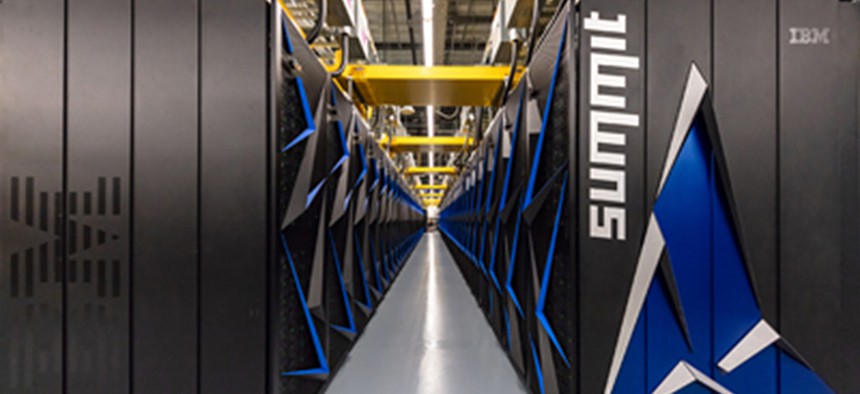Energy Department Boots Up America's Most Powerful Supercomputer

The IBM-built Summit supercomputer ORNL
The Summit runs roughly eight times faster and five times more efficiently than America’s most powerful supercomputer to date.
The Energy Department on Friday unveiled the fastest scientific supercomputer in the country—and perhaps the world.
The Summit supercomputer, built by IBM and housed at Oak Ridge National Laboratory in Tennessee, can conduct more than 200 quadrillion calculations per second—that’s 200 followed by 18 zeros.
At peak performance, Summit runs roughly eight times faster and five times more efficiently than Titan, America’s most powerful supercomputer to date, and also outpaces China’s Sunway TaihuLight, the most powerful machine in existence.
To put it in perspective, a problem that Summit could solve in an hour would occupy a typical PC for approximately 30 years.
“Today’s launch of the Summit supercomputer demonstrates the strength of American leadership in scientific innovation and technology development,” said Energy Secretary Rick Perry at the Summit debut event. “It’s going to have a profound impact in energy research, scientific discovery, economic competitiveness, and national security. Summit will empower scientists to address a wide range of new challenges, accelerate discovery, spur innovation, and above all, benefit the American people.”
The supercomputer took more than five years to build, according to Jack Wells, director of science for the Oak Ridge Leadership Computing Facility. If the agency exercises all future contract options, the total bill for Summit could run up to $280 million, ORNL Media Relations Manager Morgan McCorkle told Nextgov.
The announcement comes as the agency prepares to pour billions over the next five years into building two exascale supercomputers, which scientists predict would mirror the computing power of the human brain. Summit is already capable of running some scientific applications at exascale speeds.
The agency said it plans to use Summit to achieve breakthroughs in energy research, advanced materials, artificial intelligence and other areas that are currently deemed “impractical or impossible." Genomic scientists have had a chance to conduct studies using the machine, and the agency has already reserved Summit for a handful of groups researching cancer, fusion energy, disease and addition.
“Summit is at the leading edge of computing—it’s an inflection point in how supercomputing will evolve,” said Paresh Kharya, director of accelerated computing at NVIDIA, in a call with reporters. The machine contains some 27,000 graphics processing units built by NVIDIA.






